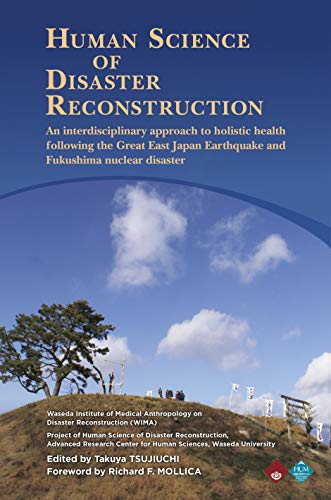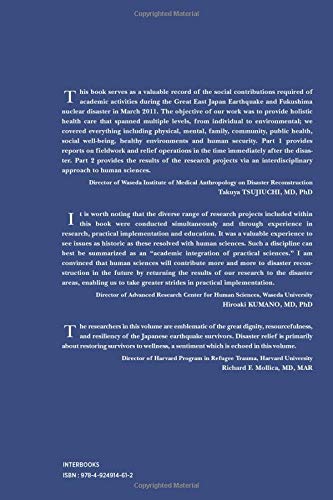Research Purpose
The impact of the Great East Japan Earthquake (GEJE) arose severe worldwide complex issues surrounding our contemporary world. The mission of our research institute is to evaluate medical, mental health, socio-economic, and cultural issues after natural and man-made disaster around pan pacific area, and also create solutions on disaster reconstruction with the scientific methods of applied medical anthropology. We will present these achieved knowledge and opinions not only to Japanese government but also to the worldwide academic and political fields.
Background of the establishment
This institute is established by the idea of Professor emeritus Yasushi Kikuchi who conducted the former project research institute that called “Institute of Medical Anthropology (2007-2011)” at Waseda comprehensive research organization. The former institute focused on the issues of immigrant workers from South-America, and this institute will focus on disaster reconstruction. This institute will become the core organization of “The Project of Disaster and Human Sciences” which has been continued researching after GEJE by volunteer professors at Faculty of Human Sciences, Waseda University. In addition, it is important that we will collaborate with Harvard Program in Refugee Trauma (HPRT) in the U.S. which has made world leadership in the health and mental health care of survivors of mass violence, trauma, and disasters for the past thirty years, and we can create the solutions on disaster reconstruction from worldwide view.
Research Overview
“The project of Disaster and Human Sciences” have performed several large survey cooperated with Shinsai Shien Network Saitama (SSN) and NHK Fukushima broadcasting office on the victims of GEJE who are living in Saitama, Tokyo, and Fukushima prefecture. We conducted these survey and research by the holistic scientific methods within Medical Anthropology, Behavioral Science, Clinical Psychology, Social Welfare, Developmental Human Ethology, Architect Environmental Psychology, and Public Health. These survey evaluate whole life issues of the victims which include disaster stricken situation, socio-economic situation, physical and psychological statement, social capital, housing and environmental situation, and compensation issues. The outcome of our research was presented as NHK documentary movie “Fukushima: Two Years Later” (March, 2013), a lot of newspaper articles, the book “GAJUMARU: Banyan Tree as Support model” (Waseda Inc.), articles in the Journal “SEKAI”, speech at the Cabinet Committee and the National Assembly, and written opinion to the prefectural and municipal governments.
Many of our research staff had experiences of supporting and researching after Great Hanshin Kobe Earthquake in 1995. After GEJE we continued to conduct support and field work research at disaster area mainly at Fukushima, and also at Saitama, Tokyo as evacuating area. We invited as adjunct researchers the representatives of private support groups in order to create problem-solving method for the victims mainly, additionally several professionals at the subjects of development anthropology, architectural anthropology, cultural anthropology and medical doctor who are performing field research and support victims. Harvard Program in Refugee Trauma (HPRT) is the key partner to establish the knowledge of solution on disaster reconstruction from worldwide view around pan pacific area.
Research fields of our institute:
- Physical and psychological health issues (disaster related death, trauma, radiation exposure, etc.)
- Human and social network and health issues (health information, social capital, etc.)
- Social welfare of the provincial reconstruction issues (human relationship, recovery of community network, etc.)
- Family and children issues (raising children, education, restructuring of family relationships, etc.)
- Architectural issues over the surrounding environment and housing (temporary housing, disaster public housing, awareness of disaster prevention, etc.)
- Reconstruction and inheritance issues of the local culture and environment (destruction of the environment and culture, etc.)
- Legal issues related to compensation and compensation (Legal development for life reconstruction, etc.)
- Support strategies by private organizations (comprehensive support of medical, psychological, welfare, education and the legal field, etc.)
Progress of the study since its establishment in 2014
The Institute has conducted research from an academic and interdisciplinary perspective encompassing behavioral medicine, clinical psychology, community welfare, developmental behavior, built environment psychology, and public health. The Institute has explored the ways to live better by understanding the totality of the interaction between the human body and mind and the surrounding environment, and by clarifying the whole picture of human survival.
During the first five years after its establishment, in collaboration with the private support group, “Disaster Support Network Saitama (SSN)” and “Japan Broadcasting Corporation (NHK) Sendai Broadcasting Station, Fukushima Broadcasting Station, Tokyo Main Bureau, Social Affairs Department”, we have conducted a large-scale questionnaire survey targeting victims of the Great East Japan Earthquake and the nuclear accident in Fukushima, Miyagi and Iwate Prefectures, and also field surveys and interviews conducted by each researcher individually or with students and graduate students belonging to their own laboratories.
Results of the first five years of research
The results of five years of research activities were compiled into the English-language book “Human Science of Disaster Reconstruction: An interdisciplinary approach to holistic health following the Great East Japan Earthquake and Fukushima nuclear disaster” (Interboooks, 2019) and a Japanese book “Medical Anthropology of Fukushima” (Tomi Shobo, 2019). The English-language book will be available on Amazon USA and Amazon JAPAN, and is being prepared for donation to major university libraries and international disaster-related organizations in the United States, Europe, and ASEAN.
Also noteworthy are the research project “Public Anthropology of Disaster Reconstruction: Creative Development Practices in Fukushima Prefecture” led by Yuichi Sekiya (University of Tokyo), one of our invited researchers, and the subsequent collaboration with the Center for Northeast Asian Studies, Tohoku University. The result of this collaboration is “Public Anthropology of Earthquake Disaster Reconstruction. The outcome of this collaboration has culminated in “Public Anthropology of Earthquake Disaster Reconstruction” (University of Tokyo Press, 2019).
In addition, our research results have been introduced not only in the academic field, but also nationally in the form of cooperation and appearances in NHK Special (March 2015), NHK Close-Up Gendai (March 2015), NHK Heart Net TV (May and August 2015), NHK Shiten-Ronten (June 2016), and NHK Close-Up Gendai Plus (March 2017) as well as in various newspaper articles.
“Human Science of Disaster Reconstruction: An interdisciplinary approach to holistic health following the Great East Japan Earthquake and Fukushima nuclear disaster” (Interboooks, 2019)
Office
Tsujiuchi Laboratory, Faculty of Human Sciences, Waseda University.
Address: 2-579-15 Mikajima, Tokorozawa, Saitama 3591192, JAPAN
E-mail: shinsai-wima(a)list.waseda.jp (please convert a to @)

